You experience uneasiness, feeling heavy with a bloated hard stomach. Think about it, realized that you have not had a bowel movement for a couple of days. At times, it can stretch to a few days. Finally, when there is an urge to poop, you have difficulty to pass hard and dry stool. You are not alone. Many people experience constipation from time to time. I included. It is a very common health issue caused by our modern lifestyle. Before rushing out to buy over the counter medication, there are cooking herbs that help constipation. Read on to find out if you have those herbs to make your own home remedies.
Firstly, let’s talk a bit about constipation, its causes and ways to prevent it.
What is constipation?
Should you have fewer than three bowel movements per week, you are constipated.
Constipation causes the colon (large intestine or large bowel) to swell, expand and change shape in every possible way. Because the colon does not exist in isolation, once swollen, it will compress or crush the organ next to it. It could be the liver, kidneys, gallbladder or pancreas to name a few.
Also, the leakage of toxins will affect your body organs and cells. Furthermore, backed up stools will invite microbes to multiply attracting parasites.
Constipation may happen infrequently or chronic. Regardless, you have to be mindful of these symptoms.
- • Hard stools
- • Bloated or hard stomach
- • Difficulty or straining in passing stools
- • Abdominal pain
- • Feeling as though you are blocked
What Causes Constipation & Best Way to Prevent It
While our modern lifestyle such as consuming junk and processed food, drinking alcohol and smoking contribute to the problem, there are several significant causes you can prevent.
Low Fibre Diet
This is a very common cause of being constipated. You need to get enough fibre in your diet to get it moving.
Generally, there are two types of fibre:
- • Soluble fibre soaks up water, helps keep your stool soft.
- • Insoluble fibre adds bulk to your stool, helps move through your digestive system faster.
Consume lots of fibre-rich foods including vegetables, fruits and whole grains. Consider blending your greens and fruits into mouthwatering smoothies. Doing so, you will be able to ingest more fibre than you would just by eating them. Find out how to make a healthy smoothie without a recipe and remember to add your fresh herbs.
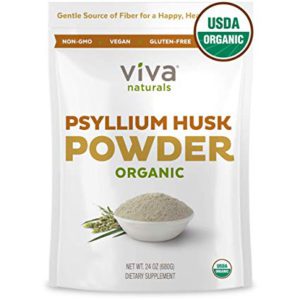
Additionally, you may consider including psyllium husk in your daily health diet.
Psyllium is a type of fibre commonly used as a gentle, bulk-forming laxative. However, you must understand that more fibre is not always better. It is important to take it with water and drink water regularly throughout the day. This takes us to the next reason for constipation.
Inadequate Fluid Intake
Not drinking enough fluid is the most common contributing factor to constipation. Fluid helps move the food through your digestive system and soften the stool.
Generally, you must aim to drink 9 cups of water per day. If you are constipated and taking a fibre supplement, you need to drink more.
Besides water, you may consider other beverages such as green tea, black tea, or fresh juices. Read more about juicing with herbs here.
High Meat Consumption
Meat, especially red meat is low in fibre and high in fat. This combination may increase the risk of constipation. If you are consuming more meat than vegetables, your fibre intake lessens.
Consider replacing the red meat in your daily diet with protein and fibre-rich alternatives such as beans, lentils and peas.
Lack of Exercise
Physical movements can get the bowel moving. It helps stimulate the muscles in your intestines and colon.
I get it. You may not feel like moving at all while with a heavy stomach. But, you may get quick relief for constipation by exercising regularly.
Medications
 An article on WebMD, The Basics of Constipation, mentioned that medications that cause constipation include narcotics, diuretics, iron supplements, antacids, and drugs for blood pressure, seizures, and depression.
An article on WebMD, The Basics of Constipation, mentioned that medications that cause constipation include narcotics, diuretics, iron supplements, antacids, and drugs for blood pressure, seizures, and depression.
Talk to your medical practitioner to get a clear understanding and advice should you feel that your current medications interfere with your bowel movement.
Overuse of laxatives
Laxatives are medicines to treat constipation by softening the stools, making passage easier. Or stimulating the lower intestine to push out the stool.
Overuse of laxatives can cause long-term and potentially permanent damage to the digestive system. They can decrease your colon’s ability to contract and actually aggravate constipation. Furthermore, it can lead to electrolyte disturbances, dehydration and mineral deficiencies.
Electrolytes which include calcium, chloride, potassium, magnesium and sodium help regulate several body functions. An electrolyte imbalance can cause abnormal heart rhythms, weakness, confusion and seizures.
Exercise care if you choose to use a laxative. There are many types of laxatives. Generally, bulk-forming laxatives, also referred to as fibre supplements are the mildest on your body and safest to use. For instance, Metamucil and Citrucel. While you can easily purchase them over the counter, it is best to seek your doctor’s advice.
Stress
 Stress can upset your gut and make you tense your muscles, causing constipation. On the other hand, chronic constipation trigger anxiety and stress. This is a nasty cycle of stress, worsening the condition.
Stress can upset your gut and make you tense your muscles, causing constipation. On the other hand, chronic constipation trigger anxiety and stress. This is a nasty cycle of stress, worsening the condition.
No matter it is your emotions or bowels that starts the stress cycle, it is important to manage your stress level.
Needless to emphasis, exercise regularly helps. Consider yoga and meditation, and try adding herbal teas into your self-care routine.
5 culinary herbs and spices that relieve stress. Read more here.
Keeping a consistent schedule helps too. Getting up and moving around at the same time every day may help you avoid constipation. Visit the loo first thing in the morning or before bedtime. Find your ideal time and stick to it. Also, if there is an urge to poop, do not withhold.
Here is a study published in The National Center for Biotechnology Information. It concluded that stress causes bowel dysfunction.
Natural Remedies for Constipation from the Kitchen
Cooking herbs and spices do more than just flavouring your dishes. Most contain phytonutrients that benefit your body functions. In this case, they help with constipation.
Peppermint
This common cooking herb contains menthol, which has an antispasmodic effect that relaxes the muscles of the digestive tract and allows easy passage for food.
Also, the carminative property in peppermint relieves flatulence related to stomach bloating and constipation.
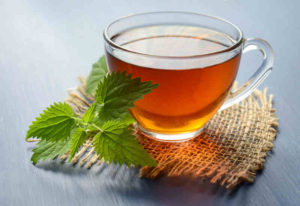 Many over the counter medicines for digestive problems contain peppermint extract.
Many over the counter medicines for digestive problems contain peppermint extract.
Peppermint tea can be brewed by adding a few sprigs of peppermint to two cups of hot water. Steep for 5 – 10 minutes. You may use just the peppermint leaves.
Caution: Peppermint is NOT recommended for people with heartburn or GERD because it relaxes the muscle in the oesophagus and stomach, thus worsen the acid reflux.
Fennel
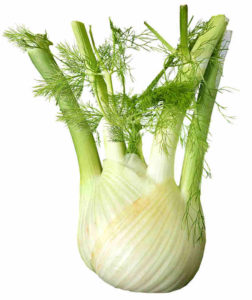 This is a hardy, perennial herb with a pale bulb and long green stalks. All parts of the fennel plant, including the bulb, stalks, leaves and seeds are used in cooking but the seeds are mainly used in herbal medicine.
This is a hardy, perennial herb with a pale bulb and long green stalks. All parts of the fennel plant, including the bulb, stalks, leaves and seeds are used in cooking but the seeds are mainly used in herbal medicine.
The volatile oils found in fennel seeds can help kick start digestion by promoting the production of gastric enzymes.
On top of that, drinking fennel tea helps cleanse your body and move toxins through your system.
Brew your fennel tea by adding 1 teaspoon of dried fennel seeds into 1 cup of hot water. Steep for 10 minutes. You will get a light yellow infusion. Drink 3 times a day.
Fenugreek
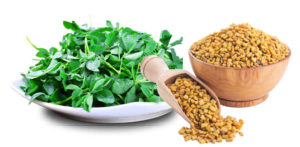 This is an annual herb plant with light green leaves and small white flowers. Both its leaves and seeds are popular ingredients in Indian cuisines.
This is an annual herb plant with light green leaves and small white flowers. Both its leaves and seeds are popular ingredients in Indian cuisines.
Fenugreek seeds are ancient spice with a long history of use in food and as medicines.
The high content of water-soluble fibre in fenugreek helps relieve constipation. Foods that contain a large amount of soluble fibre are known as bulk-forming laxatives. When soluble fibre absorbs water in the intestines, it expands or increases in bulk. The expansion pressures the intestines and triggers contractions that move stools through the passage thus stimulating bowel movements.
You can easily make your own fenugreek tea by adding 1 teaspoon crushed fenugreek seeds to 1 cup of hot water. Steep for 5 minutes. Strain, add honey is desired and drink 2-3 times a day.
Ginger
Ginger root has been used in Chinese and Indian cultures since ancient times. It is a vegetable but commonly considered a herb or spice in the culinary world. Also known as the “warming herb”, ginger increases the heat generation in the body that can help accelerate slow digestion.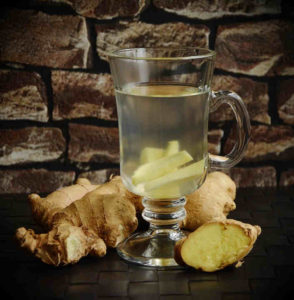
When constipation stems from poor digestion, ginger tea can help after a heavy meal.
Make a simple ginger tea by adding a thumb-sized piece of fresh, peeled ginger to 2 cups of boiling water. Allow steeping for at least 20 minutes. Add honey if desired.
Turmeric
A common spice and major ingredient in curry powder, turmeric has been used to treat various conditions, ranging from colds, infections to digestive problems. Its medicinal properties mostly come from curcumin, which is an anti-inflammatory compound.
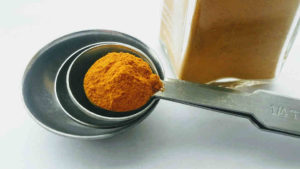 Turmeric is said to have the potential to reduce IBS symptoms. Irritable Bowel Syndrome is a common disorder of the digestive system. It causes abdominal pain, cramping, bloating, gas and constipation or diarrhoea, or both.
Turmeric is said to have the potential to reduce IBS symptoms. Irritable Bowel Syndrome is a common disorder of the digestive system. It causes abdominal pain, cramping, bloating, gas and constipation or diarrhoea, or both.
A pilot study conducted way back in 2004 concluded that turmeric may help reduce IBS but placebo-controlled trials are warranted to confirm these finding. In this study, human participants with IBS took 1-2 tablets of turmeric every day for 8 weeks reported reduced abdominal discomfort and improved bowel movement.
While you can easily buy turmeric supplements or turmeric tea online, try making your own turmeric tea.
Add 1 – 2 teaspoons of ground turmeric into 4 cups of boiling water. Stir the mixture and simmer for 10 minutes. Strain and let cool.
You may add honey, lemon, lime or ginger to enhance the antimicrobial properties and antioxidant of the drink.
Adding whole milk, almond milk, coconut milk or coconut oil will increase the absorption because curcumin requires healthy fats to dissolve properly.
Check out my Turmeric Tea review here.
Consider Magnesium Supplements
Magnesium is a mineral that is essential for your overall physical health. It plays an important role in muscle function, heart rhythm, blood pressure, immune system and blood sugar level.
Oral magnesium supplements work as an osmotic laxative. It draws water into the intestines thus soften the stool. Additionally, it relaxes the muscles which help to create a smoother passage.
You can buy magnesium capsules at pharmacies and health food stores. However, you must talk to your doctor or pharmacist if you have a history of kidney problems. Also, magnesium may interfere with the effectiveness of some prescription medications.
Have You Heard of Triphala
Triphala is a very common and popular Ayurvedic medicine for constipation used by many Ayurvedic physicians. Literally meaning “three fruits” in Sanskrit, it is a herbal remedy that consists of Amalaki, Bibhitaki and Haritaki.
Together, these three fruits have a combined effect covering the whole metabolic process. Amalaki helps with digestion, Bibhitaki helps with absorption and Haritake helps with elimination.
I read a very good article about the health benefits of Triphala on Very Well Health. Learn more if you are interested to find out.
If you consider using Triphala tablets to manage your constipation, conveniently buy on Amazon.
Caution: You may want to avoid Triphala if you are taking chronic medications for diabetes and hypertension as it may reduce their efficiency.
When to See a Doctor
Constipation can happen every now and then. You may be going through a stressful day or week with irregular or unhealthy meals. If your condition becomes too regular or the following symptoms arise, it is time to see your doctor.
- • Rectal pain
- • Blood in stool
- • Unexplained weight loss
- • Sudden onset of severe cramping
- • Severe abdominal pain and bloating
- • Alternating constipation and diarrhoea
Besides, you should talk to your doctor if the laxatives you are consuming are not working after several weeks of use.
Consider This - A Herbal Journey
Whether you are looking into herbalism as a hobby or personal endeavor or preparing for a career, The Herbal Academy has herbalist program packages to suit your path and your educational needs!
The Holiday Sale in on. All programs are discounted up to A Jolly 25% off.
Take a look ↓
In Summary
Being constipated is uncomfortable and can make your life uncomfortable. Feeling bloated and heavy, of course, you want quick relief for constipation.
Try making your own remedy using the above-mentioned herbs and spices. Cooking regularly at home, you should have them in your kitchen. Else, you can always buy them from your neighbourhood store as those are common cooking herbs and spices.
While the herbal remedies may help to relieve constipation, it is important to consume a balanced diet and exercise regularly to keep the bowel movement going.
Eat fibre-rich foods such as wheat bran, oats, fresh vegetables and fruits and up your fluid intake.

Lifestyle improvements often help relieve constipation for many people.
However, if it continues, your next choice may be using over the counter laxatives.
No matter, herbal remedies or laxatives, keep in mind that while they are effective on a short term basis, continual use can cause dependency, in other words, “lazy bowel syndrome”. You don't want this.
So, what is a natural remedy for constipation? My personal experience with managing constipation is to keep a consistent schedule. If I travel, the whole system is a mess. Stress is another issue which I try to manage. A warm cup of herb tea helps me relax especially at the end of the day. On a bad day, I will have a cuppa at any time. Peppermint tea is one of my favourites. Breakfast is always a bowl of oats with raisins. If I feel much constipated, lunch will be oats again. A daily 20 minutes morning walk and simple stretching exercises. Constipation has been my companion since childhood. Now, I am very mindful in fighting it.
Before ending this article, I want you to understand that even though herbs are natural and gentler than most over the counter laxatives, they are still powerful and have the potential to cause drug interactions or negative side effects. Talk to your doctor before using herbal remedies, particularly if you are pregnant or breastfeeding.
We always say prevention is better than cure. Start a healthy lifestyle now!
Read These Related Articles
Please Leave a Comment
Now that you got to know the herbs that help constipation, will you use them? How do you normally manage your bowel movement? Please feel free to share with us in the comments section below. We can learn from each other.
Share This Article
If you find this blog post interesting, please share it with anyone that you think might find it useful. Thank you and have an awesome day!
From the Corner of My Home – Spice Up Your Life with Herbs and Spices
Disclaimer: I am not a doctor or medical professional, and this post should not be taken as medical advice. Please do your own research. Material on this blog is provided for informational purposes only. It is general information that may not apply to you as an individual and is not a substitute for your own doctor’s medical care or advice.
Disclosure: This blog post may contain affiliate links as part of the Amazon Services LLC Associate Programs and other affiliate services. This means that coenerofmyhome.com receives a small commission by linking to amazon.com and other sites at no extra cost to the readers.



I’ve tried replaying my weekly routine and eating style during the week just to know the possible cause of this infrequent constipation but couldn’t get something concrete until reading your article. I had a good amount of vegetables and enough water but I was still experiencing that…one thing I ignored was stress.
Never thought it could be a contributing factor because I’ve been stretching myself way too much with my laboratory work and other personal commitments. Comparing this week’s stress level to previous weeks, it makes sense to me that stress is the cause in my case. That’s very enlightening and I’m glad to have found your article. Great info…..keep up the good work.
Stress is often the main factor causing our health to go haywire. Exercising regularly is very helpful. It can take your mind off stressful matters. After sweating it out, your body and mind will feel relaxed. Herbs tea can further help you relax. Hope this makes you better.
Thanks for reading and commenting, and I wish you all the best. Take care.
The information you share here is invaluable! When one of my children was younger they suffered from encopresis, which could have been greatly helped had we known anything about the natural remedies you mentioned here. It doesn’t help that a lot of people don’t like to talk about this stuff but so many things that go wrong with the body can be traced to inflammation due to issues with the gut. I’ve been learning about this stuff in recent years and find that I wish I would have been taught this years ago.
Thank you for sharing it here. I shared your site with some that I think could benefit already. Keep writing.
Thank you very much, Heather.
There is so much to learn about the healing properties of herbs and spices. I am sharing as much as I can, as I go along.
Great post, You have incorporated all the ingredients in very simple form to come up with a masterpiece. I like the fruits and vegetables smoothie idea as this is a very healthy way of ingesting fiber into the body without adding a lot at once as too much fiber will cause digestion issues.
Your introduction of herbs as tea remedy is so very important. I have learnt about Fennel and Fenugreek, and I am very happy that you have shared this information about these spices. This is part of the everyday learning process for me and I’m saying thank you for this very insightful article.
Thank you, Mazie. I am happy you gained useful information here.
Wow thanks for writing this article, it has been really informative for me and good to know what herbs or different methods that might help against constipation. This article is really informative and has a lot of details about each methods so thanks for that also. I am sure to share this one
I am glad you find this article helpful, Barbara.
Good day!
Hi! I loved reading this post. I have realized that the biggest contributing factor to constipation in my case is actually what you stated at the very beginning: Not drinking enough fluid! I like green tea very much. But following your advice, I’ll also include black tea and fresh juices into my diet from here on. Thank you very much!
You are most welcome, Henry. I believe fresh juices can help. It is rather difficult to ingest a large amount of fruits or vegetables at any one time. Therefore, juicing or blending is the best way to do so. Read more about juicing with herbs here.